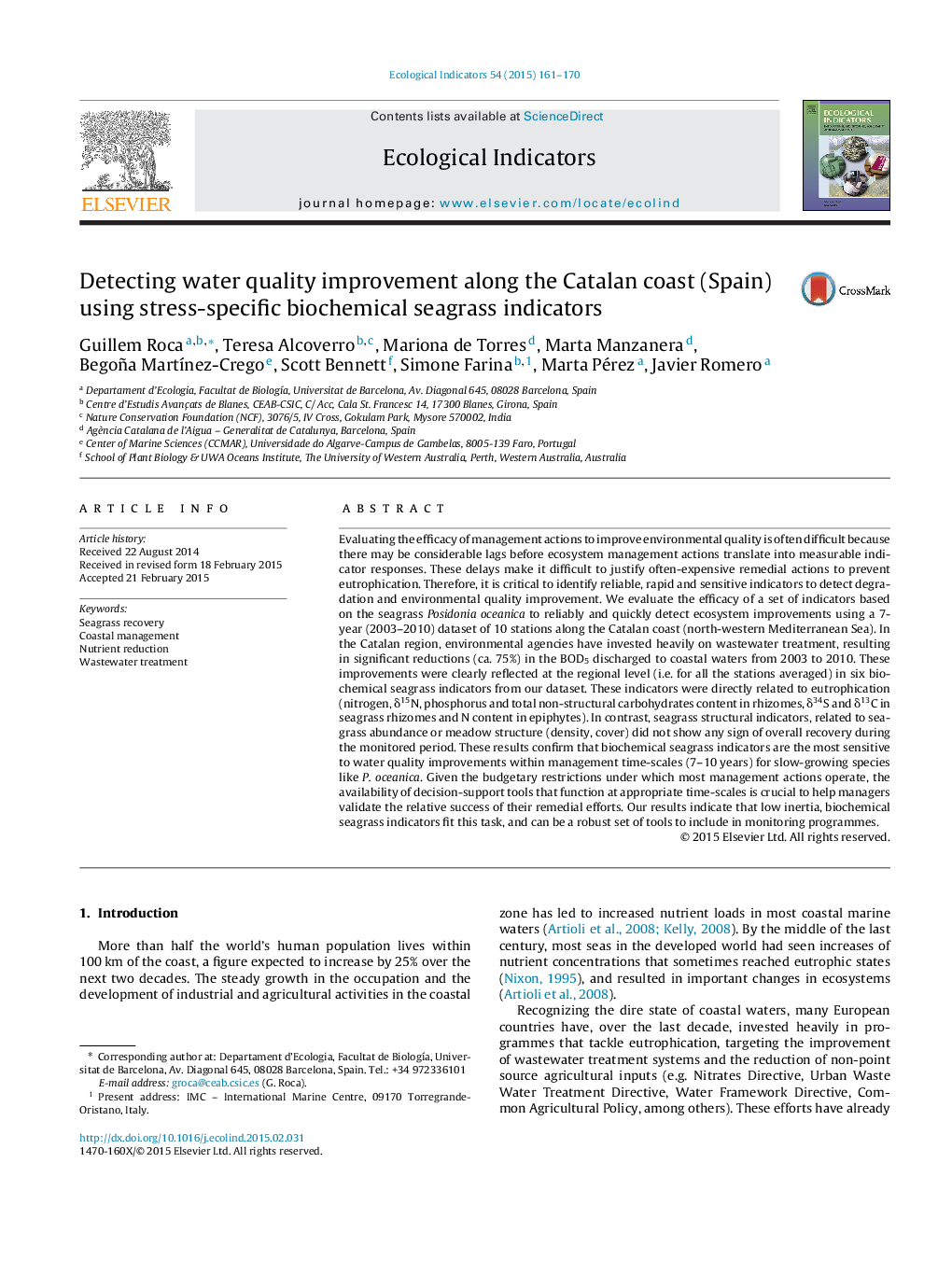| کد مقاله | کد نشریه | سال انتشار | مقاله انگلیسی | نسخه تمام متن |
|---|---|---|---|---|
| 6294481 | 1617147 | 2015 | 10 صفحه PDF | دانلود رایگان |
عنوان انگلیسی مقاله ISI
Detecting water quality improvement along the Catalan coast (Spain) using stress-specific biochemical seagrass indicators
ترجمه فارسی عنوان
تشخیص بهبود کیفیت آب در ساحل کاتالان (اسپانیا) با استفاده از شاخص های بیوشیمیایی سپراتور خاص استرس
دانلود مقاله + سفارش ترجمه
دانلود مقاله ISI انگلیسی
رایگان برای ایرانیان
کلمات کلیدی
بازیابی صخره نوردی، مدیریت ساحلی، کاهش میزان تغذیه، تصفیه فاضلاب،
موضوعات مرتبط
علوم زیستی و بیوفناوری
علوم کشاورزی و بیولوژیک
بوم شناسی، تکامل، رفتار و سامانه شناسی
چکیده انگلیسی
Evaluating the efficacy of management actions to improve environmental quality is often difficult because there may be considerable lags before ecosystem management actions translate into measurable indicator responses. These delays make it difficult to justify often-expensive remedial actions to prevent eutrophication. Therefore, it is critical to identify reliable, rapid and sensitive indicators to detect degradation and environmental quality improvement. We evaluate the efficacy of a set of indicators based on the seagrass Posidonia oceanica to reliably and quickly detect ecosystem improvements using a 7-year (2003-2010) dataset of 10 stations along the Catalan coast (north-western Mediterranean Sea). In the Catalan region, environmental agencies have invested heavily on wastewater treatment, resulting in significant reductions (ca. 75%) in the BOD5 discharged to coastal waters from 2003 to 2010. These improvements were clearly reflected at the regional level (i.e. for all the stations averaged) in six biochemical seagrass indicators from our dataset. These indicators were directly related to eutrophication (nitrogen, δ15N, phosphorus and total non-structural carbohydrates content in rhizomes, δ34S and δ13C in seagrass rhizomes and N content in epiphytes). In contrast, seagrass structural indicators, related to seagrass abundance or meadow structure (density, cover) did not show any sign of overall recovery during the monitored period. These results confirm that biochemical seagrass indicators are the most sensitive to water quality improvements within management time-scales (7-10 years) for slow-growing species like P. oceanica. Given the budgetary restrictions under which most management actions operate, the availability of decision-support tools that function at appropriate time-scales is crucial to help managers validate the relative success of their remedial efforts. Our results indicate that low inertia, biochemical seagrass indicators fit this task, and can be a robust set of tools to include in monitoring programmes.
ناشر
Database: Elsevier - ScienceDirect (ساینس دایرکت)
Journal: Ecological Indicators - Volume 54, July 2015, Pages 161-170
Journal: Ecological Indicators - Volume 54, July 2015, Pages 161-170
نویسندگان
Guillem Roca, Teresa Alcoverro, Mariona de Torres, Marta Manzanera, Begoña MartÃnez-Crego, Scott Bennett, Simone Farina, Marta Pérez, Javier Romero,
